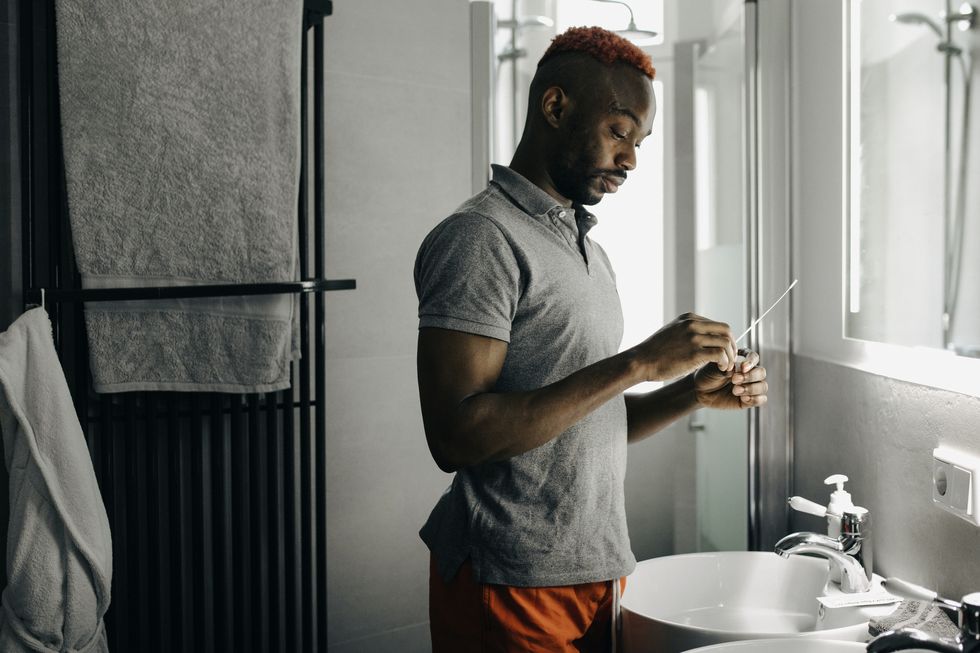COVID-19 AND THE FLU share several of the same symptoms, like fever, cough, shortness of breath, fatigue, and a sore throat. So it can be tough to know which illness you have when you’re not feeling well.
Earlier this year, the U.S. Food and Drug Administration granted emergency use authorization (EUA) for an over-the-counter combo Covid-flu test. The Lucira COVID-19 & Flu Home Test is a single-use test kit, where you use a nasal swab to collect your sample at home and get the results in about 30 minutes.
However, the test might not be available to you any time soon. Soon after it was authorized, Lucira announced that it had filed for bankruptcy.
More From Men’s Health

Still, the test is a “major milestone” in expanding access to at-home tests for infectious diseases, Jeff Shuren, M.D., director of the FDA’s Center for Devices and Radiological Health, said in February.
“The biggest benefit of a combo test is that it gives you more answers and potentially more opportunities for treatment,” says Carrie Horn, M.D., chief medical officer at National Jewish Health.
At-home Covid tests have been widely available for a while now. If someone tested negative, they might not have sought out more testing or treatments, Horn adds. Having a combo test would change that.
Lucira’s test is currently the only one with an EUA for both Covid and the flu. It accurately identified 99.3 percent of negative and 90 percent of positive influenza A samples and 100 percent of negative and 88.3 percent of positive Covid-19 samples, according to the FDA. It can also identify influenza B, but there weren’t enough cases in the clinical study, so more testing is needed.
Other tests for both Covid and the flu will likely be developed in the future, and some could also include RSV, Horn says. Here’s what you should know about the Covid-flu test.
1. It Could Help You Get Treated Faster
Having a combo test can help you know for sure which illness you have, and that can help you get the best treatment faster.
“Both COVID and influenza treatments rely on early intervention to be the most effective,” Horn says. “They need to be started within five days of symptom onset.”
It also helps stop the spread of the conditions, since someone with symptoms could test themselves at home, and their doctors may be able to prescribe medications without the need for a doctor’s office visit, says Keon Gilbert, Dr.PH, a fellow at the Brookings Institution and associate professor and co-director of the Institute for Healing Justice and Equity at Saint Louis University.
“Anything we can do to help people determine both their risk and whether or not they have a particular illness in the safety of their home is great,” he says.
2. Insurance Coverage Could Vary
When a Covid-flu combo test is ordered by a health care provider, it will likely be covered by your insurance, Horn says. But, it depends on your specific plan. It’s also likely that you can pay for one with a flexible spending account.
Otherwise, you’ll probably have to pay for it out of pocket. Lucira says its test will be sold on its website for $34.99.
3. The Test Might Not Be Available for a While
A few days after Lucira received the FDA authorization for the Covid and flu test, it filed for Chapter 11 bankruptcy. So, it might be some time before the test is available.
Lucira says it’s looking for “a strategic or financial partner” to resume manufacturing and developing new at-home testing products. Men’s Health reached out to Lucira for an update, but the company didn’t respond.
4. The Accuracy Depends on Taking a Good Sample
With any at-home test, the accuracy depends on collecting a good sample. Lucira’s test uses a nasal swab, a process similar to other Covid tests, and that can be a little uncomfortable, Horn says.
It’s always important to follow the instructions to a T to make sure you get an accurate result, Gilbert says.
False positives and negatives are a risk with any rapid diagnostic test, the FDA says.
If you test positive, you should take steps to prevent spreading the illnesses, such as staying home when you’re sick and wearing a mask. If you test negative, you might want to get the results confirmed with your doctor.
5. You Might Still Need a Doctor’s Evaluation
At-home tests provide useful information about what might be causing you to feel sick, Gilbert says.
But sometimes your symptoms need further evaluation, Horn adds. “When people have influenza or Covid, we worry about if they have normal or low oxygen saturations, or are there other signs that the initial viral infection has progressed to pneumonia or lung damage,” she says. “These things require different treatments, and delayed treatment can lead to severe illness or death.”
6. You Should Take Steps to Prevent Covid and the Flu
Covid-19 and the flu are contagious and can cause serious respiratory illness and even death. You can also get both conditions at the same time. So, taking steps to avoid getting sick is the best approach.
Getting vaccinated is the first step in prevention. “Annual flu shots and staying up to date with Covid vaccination and boosters as indicated by the Centers for Disease Control and Prevention can significantly decrease the risk of severe illness, hospitalization, and death,” Horn says.
Washing your hands, using hand sanitizer, staying home when you’re sick, and wearing a mask if you must go out can keep you from spreading the illnesses, she adds. And, if you’re having a high fever or difficulty breathing, seek emergency care.
“We all have to remember that we’re still susceptible to Covid-19 and the flu,” Gilbert says. “People need to continue to think about their individual risk and how their risk intersects and interacts with our choices to be out in the world.”
Erica Sweeney is a writer who mostly covers health, wellness and careers. She has written for The New York Times, HuffPost, Teen Vogue, Parade, Money, Business Insider and many more.




Comments are closed.